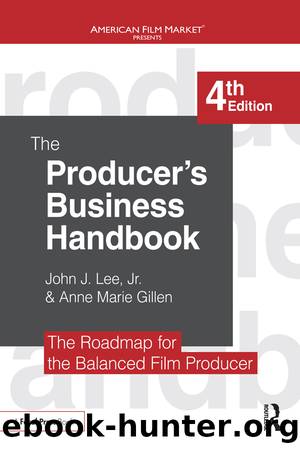The Producer's Business Handbook by John J. Lee Jr. & Anne Marie Gillen

Author:John J. Lee, Jr. & Anne Marie Gillen
Language: eng
Format: epub
Publisher: Taylor and Francis
Producersâ Perceived and Real Value of Completion Guarantors
The entertainment industry has a uniquely demanding production process. Producers create distinctively new products, one at a time. A producer cannot learn about producing one project (even franchise projects) and then use this experience to produce the same project again. Every project is exclusive in its production chemistry. Production techniques are sometimes similar from project to project, but changes in the above-the-line talent (even if they are the same people), the below-the-line crew, locations, and production demands cause these components to perform in a substantially different manner for each project.
Each projectâs unit production manager (UPM) is responsible for planning and quantifying the physical production process in schedules and costs. Producers sustain an often-painful balance between each projectâs creative options and associated costs. Producers seek production managers who will plan and budget each project in a manner that will fulfill the producerâs vision. Consequently, producers seek and value UPMs who understand and employ economies that allow more production value to be delivered at less cost. This is a challenging balance to maintain, with many offsets negotiated and often renegotiated for exceptions throughout development and production.
Because of often intense give-and-take planning, negotiating, and budgeting, some producers may initially begrudge the cautious scrutiny their production plans and budgets receive during their initial completion guarantor reviews. It isnât that these producers lack confidence in producing according to their preparations. They take meticulous care to achieve a delicate balance between a projectâs production quality and its schedules and budget. The concern comes in exposing the producerâs sophisticated planning and budgeting work to independent completion guarantor review, whose bonding criteria typically challenges, if not alters, the projectâs tightly woven economy.
Although tradition has it that the only reason a completion guarantor participates in the production process is to facilitate financing (and that is its central purpose) guarantors often are and should be invited to contribute more. Each projectâs guarantor is the second set of careful eyes (after the UPM), confirming that the production team, plan, schedules, and budget are sound and achievable. Almost always the guarantorâs observations and suggestions substantially contribute to the projectâs overall production and success.
The guarantor has a fresh evaluation advantage. Guarantors have no financial, political, or creative relationships influencing them, so they evaluate solely from a business position. Because they often have substantially deeper production review experience than even their most prolific producer clients, they are more current in their references of primary production and performing talent, as well as global costs.
Guarantors should be included in the producerâs determination of each projectâs director, principal cast, and even department heads. They keep current on the personal stability and relative performance capacity of all substantial talent. For those about whom they do not possess internal information, they can obtain it from other uniquely expansive and reliable sources. There is no cost for this assistance, and it is exceptionally helpful throughout the planning process. The guarantor will eventually evaluate the bondability of primary talent anyway. It is better for
Download
This site does not store any files on its server. We only index and link to content provided by other sites. Please contact the content providers to delete copyright contents if any and email us, we'll remove relevant links or contents immediately.
Kathy Andrews Collection by Kathy Andrews(10516)
The remains of the day by Kazuo Ishiguro(7550)
Spare by Prince Harry The Duke of Sussex(4195)
Paper Towns by Green John(4168)
The Body: A Guide for Occupants by Bill Bryson(3797)
Be in a Treehouse by Pete Nelson(3211)
Harry Potter and the Goblet Of Fire by J.K. Rowling(3039)
Goodbye Paradise(2957)
Never by Ken Follett(2878)
Into Thin Air by Jon Krakauer(2699)
The Remains of the Day by Kazuo Ishiguro(2617)
The Genius of Japanese Carpentry by Azby Brown(2608)
The Cellar by Natasha Preston(2594)
Drawing Shortcuts: Developing Quick Drawing Skills Using Today's Technology by Leggitt Jim(2532)
120 Days of Sodom by Marquis de Sade(2434)
Architecture 101 by Nicole Bridge(2348)
The Man Who Died Twice by Richard Osman(2293)
Machine Learning at Scale with H2O by Gregory Keys | David Whiting(2281)
Fairy Tale by Stephen King(2062)
